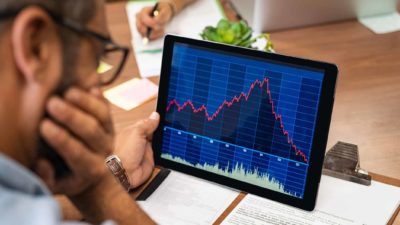A quick note: A version of this article was previously released for our Motley Fool Pro 2.0 service. We are making a revised version available for fool.com.au readers.
The reason we are doing this is because we believe that, in a time like this, people need a variant perception as well as a longer-term mindset, which we believe this commentary contains. Right now, people around the world are struggling to see how things can get better, or how anything will ever get back to 'normal'.
Yes, the future is very uncertain right now, but this is not the first crisis humans have endured. We will endure, and we will see better days. That is the message we want to share with as many readers as possible.
Very few — if any — individuals could say that their lives have not been impacted by the current coronavirus crisis.
Not only are we being (necessarily) forced into isolation, many jobs have also been temporarily or permanently displaced, others are having to quickly adjust to new living or working arrangements, and companies are being forced to adapt on a daily basis.
No doubt about it, things are tough right now. And, in all likelihood, they're going to get tougher before conditions begin to ease.
But, in truth, things may never go back to 'normal' — at least not in the sense we've become used to. That isn't to say that the coronavirus won't pass; rather, I think we should expect some things to change forever — many, perhaps, for the better.
Innovation through crisis
Recall a time when you were driving to or from work and you saw a large traffic jam ahead. Or perhaps a road closure due to planned works. You quickly detoured and found an alternate way to your destination.
Maybe, just maybe, you found that you actually prefer that alternate route — because it's faster or because you enjoy the scenery more — and decide to travel that way on a more permanent basis.
The scenario described above is hardly a crisis — certainly not when you compare it to the one we currently find ourselves in — but it does demonstrate how unforeseen circumstances can change our behaviour. Without that traffic jam or road closure we'd have likely just stuck to our old ways and never even stopped to consider how we could improve.
For many companies and individuals, doing things the 'ordinary' way is no longer feasible (at least not for the foreseeable future) so they are being forced to adapt and innovate. They're being forced to make quick decisions and to take risks, while at the same time considering carefully, and with discipline, how they spend their precious capital.
At the same time, they're being presented with new problems that we've never had to face before — nor one that many of us ever imagined possible. And with new problems come new needs and new solutions, some of which may well prove to have a major influence on our future.
World War I, for instance, was the catalyst for many innovations, some of which are still widely used today. The 'radiological car' (now known as 'portable x-ray') was developed by Marie Curie to bring this medical technology from the big cities straight to the battlefield. Air traffic control was also born through invention by the U.S. Army which enabled communications between an operator on the ground and the pilot, as well as pilot-to-pilot.
Meanwhile, Walt Disney Co (NYSE: DIS) was originally incorporated in 1929, just as the Great Depression was getting started. Recognising that the world needed to be given a good reason to smile, brothers Walt and Roy Disney released their first full-length animated film, Snow White and the Seven Dwarves, just after the Great Depression ended.
These examples highlight how a crisis can be the catalyst for necessary change and innovation. And that innovation can have a very positive influence on our future.
What does the future hold?
If you've been keeping an eye on international share markets, you might have noticed that while many stocks have fallen sharply, others have rocketed higher.
Back to the office?
Zoom Video Communications Inc (NASDAQ: ZM) is one such business. Zoom had already taken the world by storm with its cloud-based video conferencing tool. With travel severely restricted, Zoom is no doubt receiving even more attention now than ever before.
That demand may subside if employees shift back to their corporate offices. On the other hand, there is no guarantee that offices will return to how they were, pre-crisis.
Corporations spend a fortune fitting out and renting their corporate office spaces and incur numerous overhead costs. Now that many are enforcing strict work-from-home measures, while some companies will see a dip in productivity others may recognise substantial improvements.
I have personally worked from home for a number of years now and find that I am much more productive working in my own space. Plus, I consider myself to have a great work-life balance (made much easier by the fact I don't have long commutes to and from work each day).
By offering that flexibility, some workplaces may find they experience lower staff turnover, too.
Without those additional overheads, some companies may be able to increase staff salaries and book more profit. It could also mean less business travel and making greater use of video conferencing tools such as those offered by Zoom, and other workplace communication tools like Slack Technologies Inc (NYSE: WORK) or Trello, now owned by the Australia-based Atlassian Corporation PLC (NASDAQ: TEAM).
In fact, Microsoft Corporation (NASDAQ: MSFT) recently reported that it had seen a 775% increase in its cloud services in regions that have enforced social distancing, or shelter-in-place orders.
For those companies that do ask employees to return to the office, perhaps they will begin enforcing split shifts. That would require less office space and could ensure customers' needs are met around the clock.
Telehealth services
Telehealth services, including those provided by Teladoc Health Inc (NYSE: TDOC) — which I own shares in — also appear set for a boost. While many healthcare providers and systems may have been slow to recognise the potential benefits of treating patients online (where possible), they are now being forced to do so for their patients' safety, as well as their own.
Where symptoms can be described via a phone call or online session, and scripts provided remotely, that could reduce the need for those time-consuming doctor's visits. That is, you can continue going about your day until your doctor pings you that they're ready to see you.
I think wearable technology will help with this adoption. Apple (NASDAQ: AAPL)'s Apple Watch, for instance, can provide ECG readings which may enable virtual monitoring of a patient's heart by their cardiologist.
The growth of telehealth will, of course, depend on allowances from the government and insurance providers. As an example, Medicare has provided product codes for telehealth services provided by allied health professionals, although those are currently temporary to see us through the coronavirus crisis. They may become more permanent if they are widely adopted and healthcare providers recognise the many benefits.
Online retail
Retail is unfortunately shaping up to be one of the biggest corporate victims of the current crisis. Many around the world have been forced to shut their doors, and others are experiencing massive slumps in activity with consumers reluctant to leave their homes (or, in many cases, being forced to remain isolated).
With mass job losses, many will also cut back on what they deem to be non-essential spending which will, unfortunately, likely see some retailers go under.
But some are coping better than others. Amazon.com (NASDAQ: AMZN), for instance, has opened 100,000 new positions to help the ecommerce giant cope with a significant increase in demand.
Woolworths Group Ltd (ASX: WOW) and Coles Group Ltd (ASX: COL) are also taking on new workers to help them deal with this unprecedented situation. With people reluctant to leave their homes, many will turn to Woolworths' and Coles' home delivery options (where possible*) and may well continue to shop that way when this crisis subsides.
*Note that Woolworths and Coles are prioritising delivery to their most vulnerable customers, so some people may not be able to access these services currently.
Supply chains
While we will continue to rely on foreign suppliers, the severe restrictions on movement throughout the coronavirus crisis so far may make some importers reconsider their needs.
Audinate Group Ltd (ASX: AD8), for instance, recently moved some of its manufacturing from China to Malaysia. The rapid spread of the coronavirus around the rest of the globe may force its hand to diversify supply chains even further. Hence, some local manufacturers may benefit.
Climate response
The coronavirus crisis is a tragedy. But through this, we must also not forget about the other major crisis facing humanity — climate change.
With entire nations shut down, there have been some very interesting reports of less polluted air and waterways, giving our environment a much-needed breather. Venice's Grand Canal, for instance, is much clearer while nitrogen dioxide levels over China reduced significantly, too.
Perhaps, governments and citizens recognise the noticeable difference that less activity has made and drive a longer-term change.
For instance, people whose lifestyles depend on regular long-distance travel may think twice in the future (again, this may be a boost for video conferencing technology where that travel is work-related) while people who continue to work from home may install solar panels (as I have recently done).
Unfortunately, the desire to get economies back up and running as quickly as possible may delay this positive change. But it is important that we continue to recognise this threat, and also realise the significant improvements that can be made over time through change.
Foolish bottom line
We will get through this coronavirus crisis. Crises end, people adapt and societies can experience revolutionary changes — many of which are for the better. Rather than focusing on the short-term pain, consider the changes we may soon see and the opportunities that may rise from the ashes.








